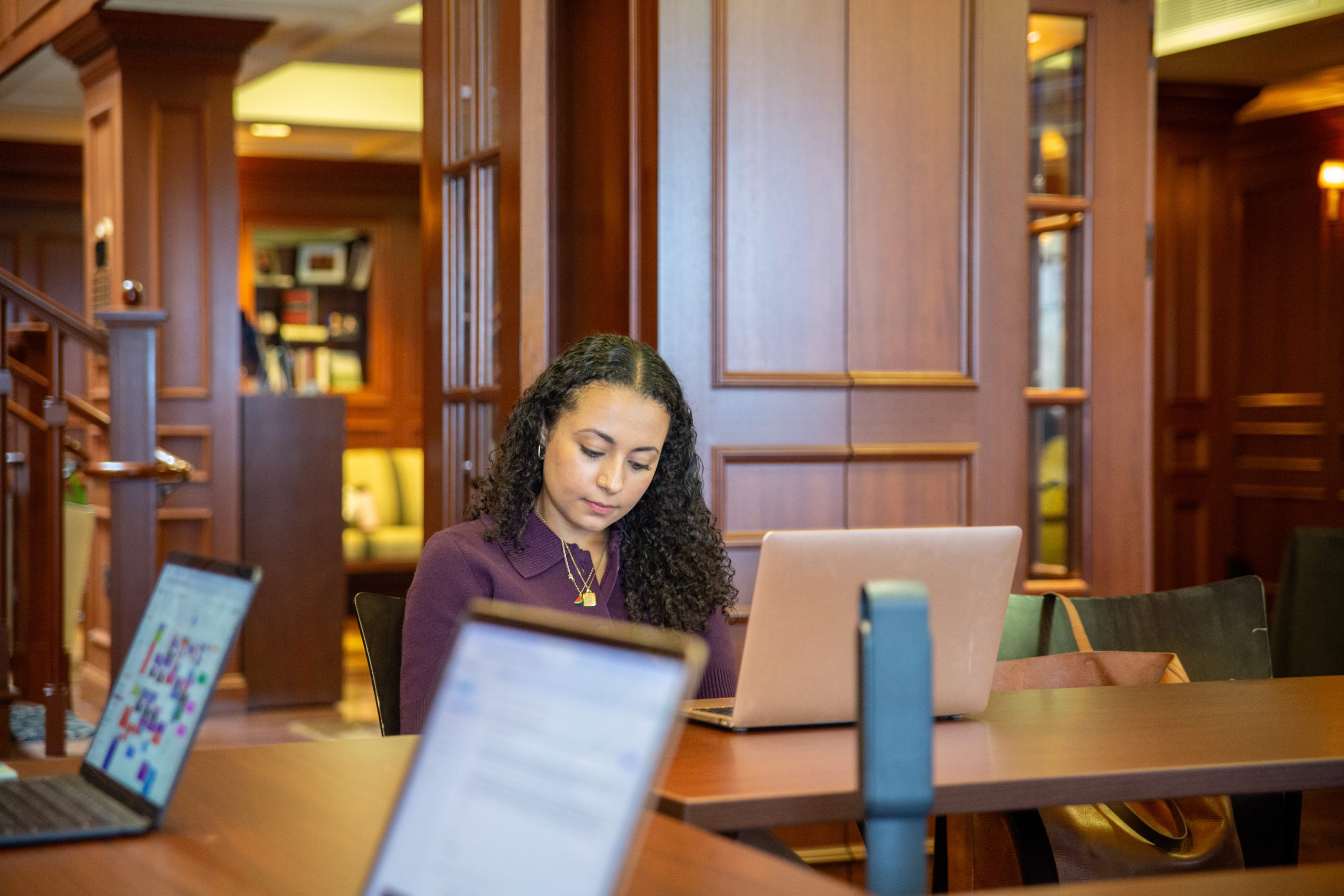MURF on the Map: Rising Seniors’ Summer 2024 Testimonies
In this article, three of our current senior students reflect on their summer and the year ahead.
Pictured: SFS Student Salmah Elmasry at the Mortara Center.
Sanjana Ranganathan
This summer I continued my research program on post-conflict Sri Lanka to investigate the effect of conflict memory on youth perspectives of current events. Last summer MURF supported me in conducting a literature review and drafting a survey. The survey includes questions to assess whether conflict memory is present among youth and investigates their views on a variety of social, economic, and political views. The target demographic is students at the University of Jaffna located in a prior conflict zone. The surveyed youth are around one generation removed from the Civil War, with most being born at the end of or after the War. By analyzing the survey results, I aim to shed light on the long-term effects of conflict memory on communities and center youth in discussions of Sri Lanka’s future. This summer the MURF program enabled me to deploy my survey and begin processing results. With the help of my faculty mentor Professor Raj Desai, I navigated common survey issues including incompletion and local political changes. I am continuing to collect survey responses and look forward to closing the survey and drawing conclusions over the next year.As I enter my last year in the Mortara program, I reflect with deep gratefulness on the MURF program. Its flexibility, close-knit community of inspiring peers, and endless support have encouraged me to take on ambitious research projects. By being able to delve into a topic over the course of multiple years, I have built a strong knowledge base that has aided me in accessing internships and excelling in my coursework. The mentorship aspect has allowed me to cultivate a close faculty relationship with and learn from Professor Raj Desai. Being a MURF has been a defining part of my Georgetown experience. I look forward to continuing to utilize the multifaceted support of the Mortara Center to explore novel international affairs questions.
Salmah Elmasry
This summer I continued my research on nude protest in North Africa and Iran. MURF generously supported my field research, where I had the opportunity to interview artists and activists in Paris and Stockholm who participated in nude protest during the Arab uprisings and other mass movements in 2011. Through my interviews, I collected data on the role of social media and digital activism in establishing networks of solidarity and developing transnational ties. My interviews additionally illuminated the role of the body as a venue of protest, and demonstrated the varied meanings of bodily protests throughout space and time. My findings will culminate in a senior thesis, which aims to investigate how transnational feminist movements develop and diffuse, particularly when activists with disparate conceptions of feminism collaborate.As I reflect on my previous three years with the Mortara program, it is clear that MURF has been foundational to my Georgetown career. I am grateful for the unique opportunity to refine my research interests and discover a ‘niche’ under the guidance of a mentor, which has allowed me to develop a sense of self. Being a part of MURF has allowed me to establish a close working relationship with my faculty advisor, Professor Clarke, whose support and expertise have been invaluable to my academic growth.
Jupiter Huang
This summer I initiated a new senior research project on the role of deterrence gaps in amplifying threat perceptions in U.S. national security planning while wrapping up a co-authored article with my faculty mentor, Dr. Toshihiro Higuchi. Last summer, MURF provided me the extraordinary opportunity to visit two presidential library archives in California with my faculty mentor to conduct primary research on our project detailing the intricacies of U.S. nuclear nonproliferation policy in Taiwan across the Nixon, Ford, and Carter administrations. In our article, we highlight how nuclear energy cooperation between the U.S. and Taiwan created a “nuclear exception” that facilitated a broad range of legal and diplomatic efforts to stem repeated attempts by Taiwan to acquire a nuclear weapon. This work sheds light into the political implications of nonproliferation policy rather than purely technical elements of safeguarding nuclear programs. This summer, with the assistance of MURF funding, a grant from the SFS Dean’s Office, and the guidance of Dr. Higuchi and Dr. Christopher Lawrence, I conducted research at the John F. Kennedy Presidential Archives into a landmark case of misinformed U.S. strategic planning—the vaunted “missile gap”—to demonstrate how a combination of structural factors, institutional dynamics, and poor adversary analysis leads to repeated cycles of investment in “overkill” weapons systems. I then presented this research at the CSIS Project on Nuclear Issues Summer Conference at the Los Alamos National Laboratory, where I exchanged ideas with key stakeholders in the nuclear enterprise to better understand the modern manifestations of the very dynamics I was studying.As I reflect on my past three years at Mortara, I am unceasingly amazed by and grateful for the opportunities that MURF has provided. I’ve cherished every conversation with my friends in the program, and found immense value in the ways MURF has informed my entire academic and professional trajectory. I’ve also been incredibly lucky to have built a strong faculty relationship with Dr. Higuchi, whose guidance, kindness, and wisdom has transformed my Georgetown experience. I look forward to making the most of my final year as a MURF, and can’t wait to see what my fellow cohort members, and the up-and-coming MURF cohorts achieve.


